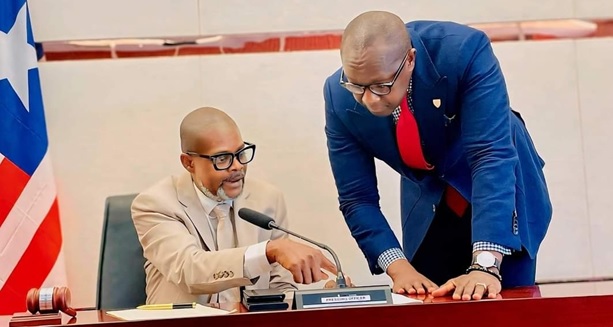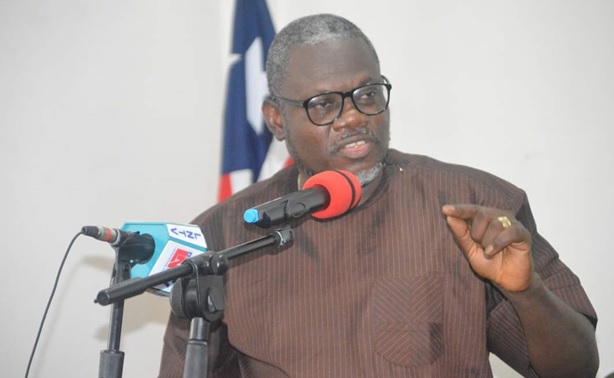MONROVIA – The highly criticized $700,000 Senate retreat held in Buchanan, Grand Bassa County, has been met with widespread condemnation from Liberians, who are grappling with the country’s poor economic conditions. The retreat’s exorbitant cost is seen as an affront to the struggling populace, whose daily lives are marred by financial hardship and lack of basic necessities.
Adding fuel to the fire, Grand Bassa County Senator and Senate Pro-Tempore Nyonblee Karngar-Lawrence reportedly disbursed $10,000 to each Senator prior to the retreat, including Senators Amara Konneh of Gbarpolu County and Abraham Darius Dillon of Montserrado County. Both Konneh and Dillon have presented themselves as paragons of integrity in Liberia, yet the revelation of these payments without public knowledge has cast a shadow over their reputations.
Martin Kollie, a noted political analyst, confirmed these payments, emphasizing the wasteful expenditure involved. “100% Confirmed: Before the Buchanan Retreat, ‘Rescue Mother’ shared $10,000 each with ALL Senators, including Abe Darius Dillon and Amara Konneh, for so-called Constituency Visits. This is $300,000 being wasted. Sad,” Kollie stated in a public address, further stoking the flames of public outrage.
The disclosure of these funds, coupled with the alleged $700,000 expenditure for the retreat, has sparked public outrage against the lawmakers. Citizens have taken to social media and the streets to express their dissatisfaction, demanding explanations and accountability from their elected officials. The sentiment is one of betrayal, as the economic plight of the average Liberian contrasts starkly with the apparent extravagance of their leaders.
In response to the growing discontent, the Senate on Wednesday, June 12, 2024, issued a press release to address the controversy surrounding the retreat’s expenses. The release aimed to clarify the misconceptions and misrepresentations circulating in various media outlets regarding the cost and intent of the retreat. The Senate’s attempt to quell the unrest highlights the gravity of the situation and the urgent need for transparency.
According to the Senate, the retreat was attended by 108 individuals, including Senators, security personnel, drivers, support staff, protocol officials, directors of departments, the retreat secretariat, and facilitators. The stated purpose of the retreat was to set the Senate’s legislative agenda, focusing on transparency and accountability, audits of the Senate, decentralization of the budget, digitization of the Senate, and the review of Senate rules, among other objectives.
The Senate’s statement emphasized that the retreat’s goals were aligned with improving governance and enhancing legislative processes. However, this narrative did little to pacify an already agitated public. Critics argue that such objectives could have been achieved without incurring such a significant financial burden, especially given the nation’s economic challenges.
Contrary to the exaggerated figures reported by some individuals and media entities, the Liberian Senate claimed that the total cost of the four-day retreat was $50,000. This assertion has been met with skepticism, as many believe the actual expenditure far exceeds this amount. The discrepancy between reported costs and public perception continues to fuel the controversy.
The recent allegations unearthed by Martin Kollie about each Senator receiving an additional $10,000 before the retreat have only intensified public frustration and skepticism towards their lawmakers. This revelation has compounded the perception of financial mismanagement and lack of accountability within the Senate, further eroding public trust in their elected representatives.
Anderson D. Miamen, the Executive Director of the Center for Transparency and Accountability (CENTAL), highlighted the broader issue of trust in a precautionary post yesterday. “When you are used to lying to the people you serve or work with, they won’t easily believe what you say, even if it is true at some point. This is the issue the Liberian Senate is faced with at the moment regarding the budget of their recent Retreat in Buchanan, Grand Bassa County. Citizens are finding it hard to believe what they are due to ‘Widespread Distrust.’ Lesson: Learn to always be truthful to those you serve or work with. It pays a lot, short term, medium term, and long term.”
The controversy continues to unfold, as Liberians demand greater transparency and accountability from their lawmakers. Civic groups, activists, and ordinary citizens are calling for a thorough investigation into the financial practices of the Senate. They argue that the lavish spending on retreats and undisclosed payments undermines the principles of good governance and public service.
In light of the public backlash, some Senators have attempted to distance themselves from the scandal. They have publicly denounced the alleged misuse of funds and called for a comprehensive audit to restore public confidence. This internal discord within the Senate highlights the deep divisions and challenges facing Liberia’s political landscape.
Meanwhile, economic experts warn that such controversies could have long-term repercussions for Liberia’s development. They stress that effective governance and prudent financial management are crucial for attracting foreign investment and aid, both of which are vital for the country’s recovery and growth.
As the Senate grapples with this crisis, it faces an uphill battle to regain the trust of the Liberian people. The scandal serves as a stark reminder of the importance of transparency, accountability, and ethical leadership in public office. For many Liberians, the Buchanan retreat has become a symbol of the broader issues plaguing their government.
The Senate retreat in Buchanan has not only sparked a significant public outcry but also exposed deep-seated issues within Liberia’s political system. The handling of this controversy will be a critical test for the Senate and could shape the future of governance in Liberia.







